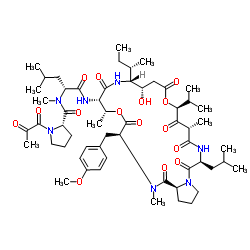137219-37-5
| Name | Plitidepsin |
|---|---|
| Synonyms |
Aplidine
N-(10-(sec-butyl)-8,11,18-trihydroxy-20-isobutyl-15-isopropyl-3-(4-methoxybenzyl)-2,6,17-trimethyl-1,4,13,16,21-pentaoxo-1,2,3,4,6,7,10,11,12,13,16,17,20,21,23,24,25,25a-octadecahydro-15H-pyrrolo[2,1-f][1,15]dioxa[4,7,10,20]tetraazacyclotricosin-7-yl)-4-methyl-2-(N-methyl-1-(2-oxopropanoyl)pyrrolidine-2-carboxamido)pentanimidic acid dehydrodidemnin B 1-Pyruvoyl-L-prolyl-N-[(3S,6R,7S,10R,11S,15S,17S,20S,25aS)-10-[(2S)-2-butanyl]-11-hydroxy-20-isobutyl-15-isopropyl-3-(4-methoxybenzyl)-2,6,17-trimethyl-1,4,8,13,16,18,21-heptaoxodocosahydro-15H-pyrrol ;o[2,1-f][1,15,4,7,10,20]dioxatetraazacyclotricosin-7-yl]-N-methyl-D-leucinamide plitidepsinum Plitidepsin plitidepsina |
| Description | Aplidine (Plitidepsin) is a potent anti-cancer agent by targeting eEF1A2 ( KD=80 nM)[1]. Aplidine possesses antiviral activity and is against SARS-CoV-2 with an IC90 of 0.88 nM. Aplidine is usually used for multiple myeloma and advanced cancer research, and has the potential for COVID-19 research[1][2]. |
|---|---|
| Related Catalog | |
| In Vitro | Aplidine (20 nM; 1 h) induces a dose-dependent decrease in VEGF secretion in MOLT-4 cells[1]. Aplidine (20 nM; 1 h) does not result in significant inhibition of VEGF-R1 mRNA in normal endothelial cells, which do express VEGFR-1 but do not secrete VEGF[1]. Aplidine inhibits SARS-CoV-2 with an IC90 of 1.76 nM. In hACE2-293T cells, Aplidine exhibits anti–SARS-CoV-2 activity with an IC90 of 0.88 nM. In an established model of human pneumocyte-like cells, Aplidine inhibits SARS-CoV-2 replication with an IC90 of 3.14 nM and a selectivity index of 40.4[1]. |
| In Vivo | Plitidepsin (intraperitoneal injection; 0.3 mg/kg or 1 mg/kg; 2 hours before infection with SARS-CoV-2) significantly reduces SARS-CoV-2 infection in BALB/c mice expressing human ACE2. 0.3 mg/kg plitidepsin group results in a reduction of nearly 2 log units in SARS-CoV-2 viral titers in the lungs, and the 1 mg/kg group leads to a reduction of 1.5 log units relative to the vehicle control group[2]. Animal Model: BALB/c mice[1] Dosage: 0.3 mg/kg; 1 mg/kg Administration: 1 day QD at 1 mg/kg; 3days QD at 0.3 mg/kg Result: Showed in vivo antiviral efficacy in mouse models of SARS-CoV-2 infection. |
| References |
| Density | 1.24g/cm3 |
|---|---|
| Molecular Formula | C57H87N7O15 |
| Molecular Weight | 1110.34000 |
| Exact Mass | 1109.63000 |
| PSA | 295.21000 |
| LogP | -0.59 |
| Index of Refraction | 1.567 |
